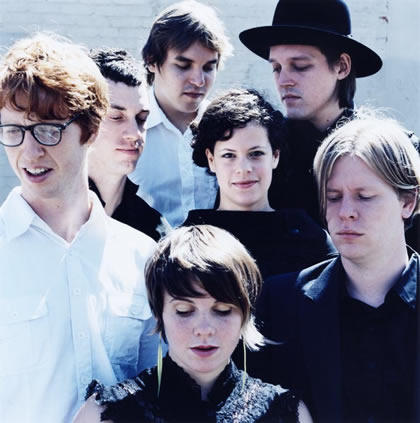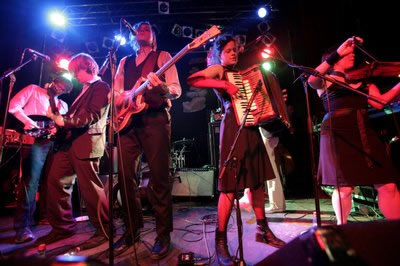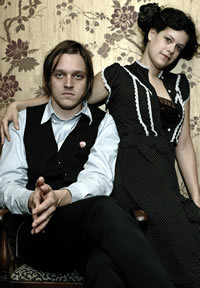
NEON BIBLE • Arcade Fire
In the summer of 2005, I saw Arcade Fire at a sold out show at Central Park SummerStage. At the end of their set, David Bowie walked on stage to sing along, first to one of his own tunes and then to close the show out with one of theirs. I'd listened to their debut album Funeral a lot for a few months and really enjoyed it, but wasn't convinced that Arcade Fire was THE band that everyone seemed to be labeling them. But the live show totally changed my mind. I've never seen a better live rock performance. They had the drama, the costumes, the live musicianship, and they even jumped around exchanging instruments. They proved not to be just some smartly packaged indie studio band after all.

So I was really anticipating their sophomore release Neon Bible, but with quite a bit of trepidation because I didn't see how a second album could possibly not disappoint. And at first listen, all I could do was compare Neon Bible to its predecessor and find flaws. It was self-aggrandizing, over-the-top, and a little undone.
After further listens, Neon Bible proceeded to endear itself to me and I've come to love its unrefined grandeur that is full blown starting with the opening track, "Black Mirror." Starting with a roll of thunder and then a pulsing guitar and Win Butler's perfected rock 'n' roll croon, it lulls in and out of excess as the piano chords rise in volume alongside Butler's arching vocals soar and the sweep of strings.
The album is brimming with, well, everything. Take for example the variants of keyboard riffs, which come in the form of church organ refrains, percussive synth vibes, and in full-chorded piano flourishes--to name a few.
All the sweeping strings, triumphant horns, the ecstatic chorus chants from Funeral have made their way into Neon Bible and then multiplied.
There are also stripped down moments, as in "Windowsill," a Springsteen-esque rock anthem in which Butler sings about how he "don't wanna live in my father's house no more." Arcade Fire's protest song, he also doesn't want to fight the holy war, live in America, or see "you" at his windowsill.
The entire album seems to be railing against something, an abstract something. As in "Intervention," in which Butler sings about, "working for the church while my family dies." The song begins with booming church organ layered with xylophone, acoustic guitar strums, and a driving bass line. It slowly arcs as the swelling strings join in along with a full choir. "Been working for the church while your life falls apart," Butler wails out of his gut.
Neon Bible is not a radical new sound or more perfectly perfected than Funeral, but that's perhaps what makes it so enjoyable--it's unfettered, unapologetic zeal that only Arcade Fire can deliver. • Katy Henriksen

|
listen to clips |
| return to covers | |
| buy it here or here | |
| arcadefire.com | |
| mergerecords.com | |
| neonbible.com | |
|
|
| puremusic home |